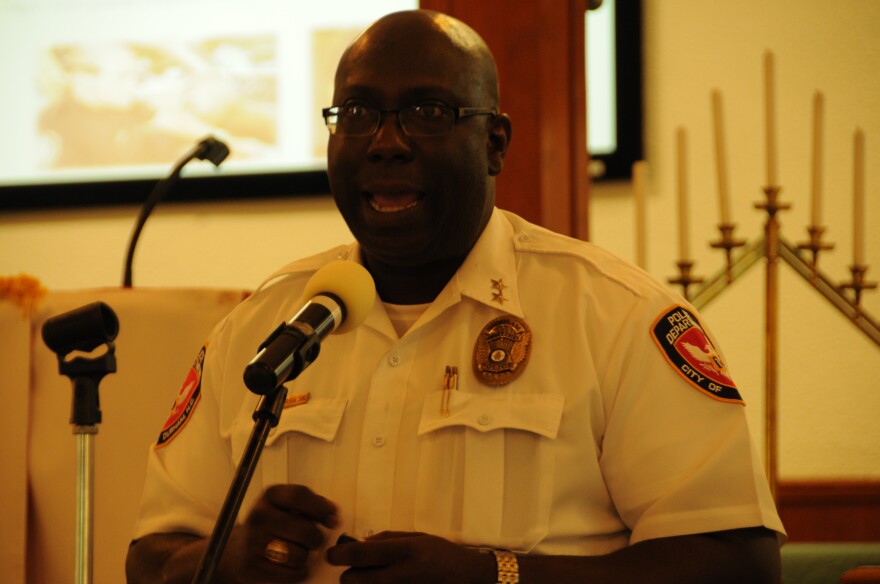How much will it cost? When would it be recording? Who could access the videos? These are a few questions that have surrounded the public forums about body cameras hosted by the Durham Police Department. But Tuesday evening's forum prompted a different question:
What will it change?
Around 75 Durham community members came together at the Russell Memorial CME Church to hear about the Durham Police Department's recent pilot test with body cameras, and to give the officers their thoughts and concerns. The department has been holding forums throughout May to ask the public’s opinion about giving officers the small, rectangular audio-video recorders.
"I have said it before and I will say it again: we are on this journey together," said Deputy Chief Anthony Marsh. "All of your input, all of your concerns, all of your wishes and wants are important to us and they are welcomed to us."
The public forums are a chance for the Durham Police Department (DPD) to engage with the people it serves and start a conversation about a tool that aims to increase police transparency. The responses have been a mix of support for police transparency and worry from residents about privacy and cost issues.
How Will Body Cameras Help?
The crowd Tuesday was not as worried about their face being recorded and showing up on the nightly news as they were about their community continuing to experience racial profiling even after body cameras come to the department. Attendees at Russell Memorial Church were predominantly African-American and raised concerns about community mistrust toward the Durham police and whether body cameras would change those relations.
'These are our aunts, our uncles, our brothers and sisters. We don't have an issue with them. Our issue is with the white police officers.'
"We already see it in instances where people have cameras and they film somebody getting choked to death on camera by a police officer and the police officer still gets away with it," Durham resident Andrew Archer said.
"If you notice, there are only African-American officers here, no white officers came. Honestly, we already know these folks- these are our aunts, our uncles, our brothers and sisters. We don't have an issue with them. Our issue is with the white police officers... if they want us to develop a level of trust for them, they have to show up."
Hear Andrew Archer's response below:
Wil Glenn, DPD public affairs manager, said the forums are about exactly that: regaining community trust.
"We have nothing to hide," Glenn said. "We want to take the bodycam forum to the community, have them give us feedback and let us know what they want us to do on their behalf."
Glenn said Russell Memorial Church was one location out of five Durham districts where the police department chose to have a forum, giving as many people as possible a chance to attend at least one forum nearby.
Below is a map of the forum locations:
Daryl Atkinson, senior attorney at the Southern Coalition for Social Justice, said communities of color have historically been over-policed in Durham and do not always hold a strong relationship with officers. He said a body camera is not going to ease decades of tension.
“Body cameras serve a purpose of being able to memorialize what happened at a given place and time but they are not a silver bullet where the dove is going to come down and people are going to be holding hands,” Atkinson said.
A2012 UNC-Chapel Hill study found that black males comprised 65.3% all persons searched during traffic stops in Durham, even though they only make up 17.6% of the city’s population.

Nevertheless, Atkinson said the forums are important for the public to hear what the police are proposing and to offer alternatives.
Reverend Wayne Williams is the pastor at Russell Memorial and said he was excited to have his church as one of the forum locations for people to come together to talk about the police and the community.
"We don’t want to have another Freddie Gray situation here," Rev. Williams said. "Having these types of dialogues will help us in the community to just keep things open. A lot of people in the community are hurting because they have not had the opportunity to voice their opinion."
Listen to Rev. Williams talk about the forum below:
DPD Not The Only Cops With Cameras
Several Triangle police departments are considering giving their patrolling officers body cameras. Hillsborough and Knightdale have already done this. Jacqui Boykin, Knightdale Captain of Support Services Division, said the cameras were initially an upgrade from the in-car cameras offices typically use. The department purchased its first camera in September 2013. Since then, Boykin said she has been able to go to video evidence and corroborate contradicting claims in an incident or complaint against an officer.
The Carrboro Police Department has been testing body cameras for its officers but has not yet introduced them to the department. Captain Chris Atack said a piece of technology clipped to their uniform is not going to cure a bad cop from doing bad police work.
“If the concern is poor behavior, sticking on a camera is not going to fix that. You need to recruit better people and you need to train them properly,” Atack said.
'If the concern is poor behavior, sticking a camera is not going to fix that. You need to recruit better people and you need to train them properly.'
Atack said the solution lies in recruiting better people to do better policing, but body cameras can be a hard selling point.
“Imagine if your employer said every time you do something I want you to turn on this camera to see if you mess up. That just screams I don’t trust you and that can be a concern from the officer perspective,” he said.
“We need to be careful not to focus on body worn cameras, change and dialogue is good but law enforcement is a tricky job and we need to do a better job of connecting with communities.”
Atack added that body cameras provide audio, but hardly give an accurate image of what is happening in front of an officer.
The Durham Police Department is scheduled to hold another forum on Thursday, May 28 at the Southwest Regional Library. Another at the Durham Housing Authority is planned, but the date is yet to be determined.
Glenn said he cannot give an exact time when DPD will have body cameras on its officers, but he expects it to be sometime soon. Until then, he said the questions and concerns people raise will continue to help write some of the department's body camera policy.











